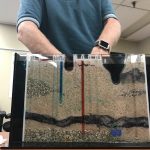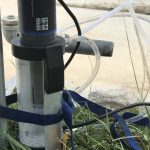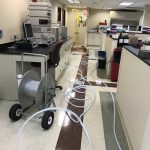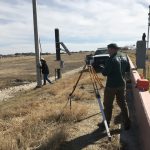Well, officially my title is “Student Trainee Hydrologist,” but I go by Water Scientist for short. I am approaching my 2 year anniversary as a Pathways Intern for the U.S. Geological Survey and what a ride it has been! I have had the opportunity to work on multiple projects and travel all over the United States for training. A few of the projects I have been fortunate enough to work on are: NAWQA (the National Water Quality Assessment Program of the Edwards-Trinity aquifer), ETN (Enhanced Trends Network of the Edwards aquifer), City of Austin trend analysis of surface water and groundwater, and the NESQA and CSQA (Northeast stream quality assessment and California stream quality assessment). I was hired originally to work on the NESQA project in the summer of 2016 and was invited to stay on and continue to work on all the other projects mentioned. On the NAWQA and ETN projects, I have sampled groundwater wells across the state of Texas for multiple constituents such as, nutrients, pesticides, pharmaceuticals, dissolved gases, nitrates as well samples to age-date the water within the aquifer. For the City of Austin, I have been gathering data from as far back as the 1950s for streams and groundwater wells funded by the City of Austin and will be performing trend analysis (example: change of concentration of nitrate levels over time) on the data and then publishing a data release of the findings. The NESQA and CESQA projects has taken up a large portion of my time as an intern and will be the project I present on for our Internship class.
These projects involve hydrologist technicians going to streams in the Northeast U.S. and California and performing intensive sampling for 12 weeks straight on approximately 50 streams in each area. After the samples were taken, the samples that needed to be analyzed for glyphosate (RoundUp) were sent to me in Austin and analyzed. I used an ELISA derivatization kit and a spectrophotometer to measure for the concentration of glyphosate in over 1500 water samples. The derivatization process takes about 6 hours and can be performed on 32 samples at a time, this 6 hours doesn’t count the shipping and receiving of the samples. I would receive anywhere from 20 to 40 ice chest a week of samples that had to be quality checked and logged into our internal database before they could ever be analyzed. Shipping and receiving was the tedious and most labor intensive of the whole process, but performing the analysis was the most interesting. Extracting the glyphosate from the water samples and seeing the concentration differences was amazing! After all samples had been analyzed, I began working on a quality control paper, to be published for the project, that paper is in review now and will hopefully be published before the end of 2018. I have also been asked to help write and make graphics for the upcoming papers that will be published from this project, I am nervous about that and also ecstatic! This project is huge and is very much in the public eye. RoundUp is one of the most widely used herbicides in the country. The NESQA and CSQA study is trying to understand who is using more of the herbicide, commercial farmers or homeowners? And if adjacent stream organisms are being adversely affected by the use? Answering and understanding these questions will help to better educate the public and industry on how long-term use of these herbicides can affect stream health. This project as well as the other projects I work on help scientist, educators, and the public to better understand why it is so important to take care of the world’s most precious resource, water.
- Tipping the rain gage on my Austin Field Unit Dam Trip
- Glyphosate analysis
- Glyphosate analysis
- Water Quality class in Denver, Coloroda
- Water Quality class – groundwater well demo
- Water Quality class – chamber set-up
- Geophysics project – trying to measure soundwaves and determine depth to groundwater and surface water/groundwater interaction
- Geophysics project
- Sonde and flow thru chamber used to take field readings
- Lab shenanigans
- Learning to field survey to take accurate gage height readings
- Field Survey
- Selfie time during field work
- Taking a break from a hard day of field work to look a the view
- Putting up a new plate to take gage height
- This is what my office looks like sometimes!
This internship has opened up so many doors and has taught me so much. The Pathways Internship program works not only with the USGS, but with several other branches of the federal government and is considered a career internship. A career internship is an internship designed to recruit and train interns for careers in the federal government and often times result in future employment offers. Mine is no different and I have been offered a full time position with the USGS Texas Water Science Center in Austin for after graduation, which I have accepted. Then I will officially have the title as Hydrologist!
Thanks for reading!
















